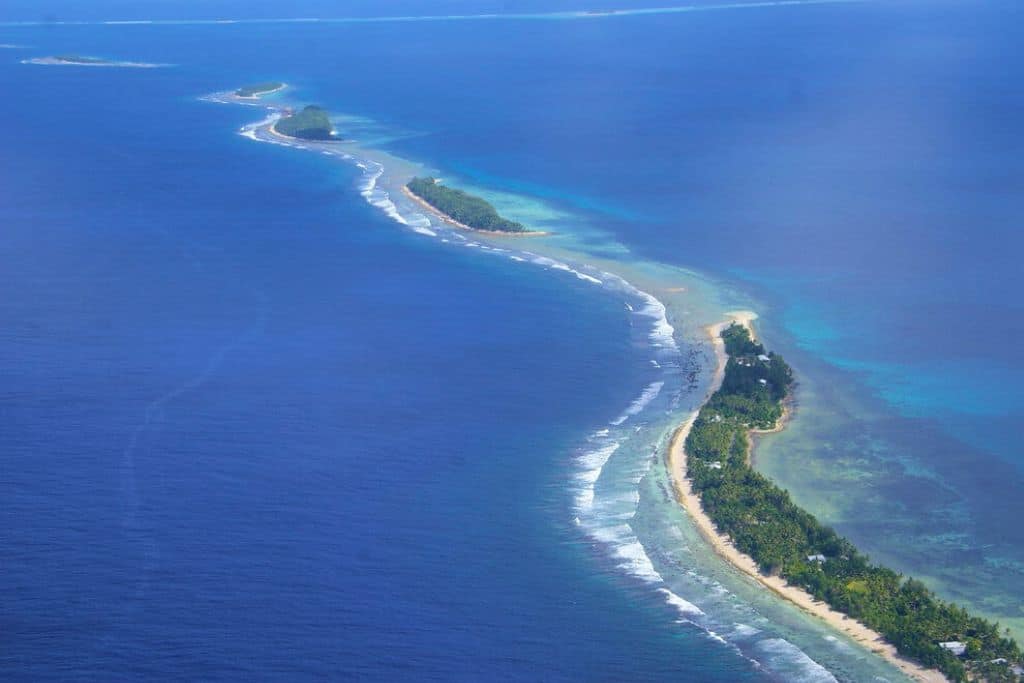In the face of the “existential threat posed by climate change,” the new visa offers Tuvalu citizens a pathway to permanent residency in Australia. Since mid-June, more than a third of Tuvalu’s population has registered for an online ballot to obtain the world-first climate visa.
—
More than 1,000 Tuvalu nationals have entered the ballot to apply for an Australian visa since it opened earlier this month. When accounting for family members – including applicants’ spouses and children – the total surpassed 4,000. For an island that is home to some 10,000 people, the number is rather impressive.
Earth.Org looks at how the visa works and why it has gained so much traction in so little time.
How Does the Visa Work?
The Pacific Engagement Visa (PEV) – Treaty stream (Tuvalu) was created as part of a bilateral treaty between Australia and Tuvalu encompassing three crucial aspects: climate cooperation, mobility, and security.
The pathway to permanent residency is open to all Tuvalu citizens above 18 years of age, as long as they have not obtained their Tuvaluan citizenship through an investment to Tuvalu and are not citizens of New Zealand. While not specifically a climate visa, New Zealand also offers citizens of Tuvalu and three other Pacific Island nations a pathway to permanent residency through a ballot system.
Only up to 280 Tuvaluans will be granted the visa every year, which allows them to work, study or live in Australia. A job offer, contrary to other visa schemes for Pacific citizens, is not required.
To obtain it, applicants must first register to an online ballot, which opened on June 16 and will close on July 18. The random selection period will open on July 25 and conclude in January 2026.
World-First Climate Visa
While the visa itself does not mention climate change, the bilateral treaty Australia and Tuvalu that led to it does. Signed in late 2023, the Australia-Tuvalu Falepili Union treaty aims to protect the two countries’ shared interests in security, prosperity and stability “in the face of the existential threat posed by climate change.”
Recognizing climate change as Tuvalu’s “greatest national security concern,” Australia committed to providing assistance to the small nation in case of natural disasters and support for adaptation. Meanwhile, the mobility component of the treaty introduced a special pathway for Tuvaluans to live, study and work in Australia permanently and access benefits granted to permanent residents of the country, including public education and health services.
When announcing the treaty in 2023, Australian Prime Minister Anthony Albanese said it came in response to a request by Tuvalu “to safeguard the future of [its] people, identity and culture”.
“That is why we are assisting on adaptation, but we are also providing the security that these guarantees represent for the people of Tuvalu, who want to preserve their culture, want to preserve their very nation going forward as well,” Albanese said at the time.

Lying just 5 meters (16 feet) above sea levels, experts have warned that up to 90% of the archipelago could be underwater by 2100. But the small nation, home to nearly 11,000 people, is also facing other climate-related threats, including water scarcity, loss of crucial ecosystems and escalating extreme weather events, which are leading financial instability and huge cultural losses.
Over the past 50 years, nearly 1,500 disasters in the South-West Pacific have caused 66,951 deaths and over US$185 billion in economic losses, according to the World Meteorological Organization.
Despite contributing only 0.02% of global emissions, the region’s 14 Small Island Developing States, including Tuvalu, are particularly at risk from climate hazards. Sea levels in the region have risen nearly twice as fast as the global average, and sea surface temperatures have increased three times faster since the 1980s. In 2019, modellings by the Australian Bureau of Meteorology found that droughts and climate change-induced floods in the region have already increased in frequency by 30%, and are projected to increase by 90% in the first half of this century and 130% in the latter half.
More on the topic: Tuvalu’s Sinking Reality: How Climate Change Is Threatening the Small Island Nation
Other Pathways
A separate pathway to obtain permanent residency in Australia for Pacific and Timor-Leste nationals is the Pacific Engagement Visa. Citizens of the 10 participating countries who are aged between 18 and 45, as well as their partners and children, can apply for one of 3,000 visas available each year, also trough an online ballot. As permanent residents, visa holders will get access to Australia’s universal health care system Medicare, public schools, child care subsidies and family tax benefits.
In 2024, the program allocated 100 visas to Tuvalu nationals.
It also allocated 1,515 visas for Papua New Guinea nationals, 300 each for Fiji, Timor-Leste and Tonga nationals, 150 each for Solomon Islands, Nauru and Vanuatu, 24 for Federated States of Micronesia and 11 for Palau nationals.
Race Against Time
The rush for Australia’s new climate visa is emblematic of the existential threat faced by dozens of nations worldwide.
The growing threats of climate change are poised to reshape the world map, permanently altering borders, cultures and geopolitics. Unless the world acts now, the disappearance of Tuvalu will serve as a prelude to large-scale loss and suffering around the world.
Featured image: UNDP Pacific Office in Fiji via Flickr.
This story is funded by readers like you
Our non-profit newsroom provides climate coverage free of charge and advertising. Your one-off or monthly donations play a crucial role in supporting our operations, expanding our reach, and maintaining our editorial independence.
About EO | Mission Statement | Impact & Reach | Write for us
This story is funded by readers like you
Our non-profit newsroom provides climate coverage free of charge and advertising. Your one-off or monthly donations play a crucial role in supporting our operations, expanding our reach, and maintaining our editorial independence.
About EO | Mission Statement | Impact & Reach | Write for us








